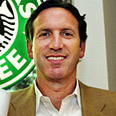
Starbucks CEO Howard Schultz, accused of supporting Gaza operation
צילום: איי אף פי
Campaign urges boycott of US firms over Gaza op
Various elements in Arab, Muslim world use social networks, text messages and leaflets to call for boycott of American products, companies such as McDonald's and Starbucks
An extensive campaign was launched on the Facebook social network several days ago, calling for a boycott of American companies over the Bush administration's support for the Israeli military operation in the Gaza Strip.
Thousands of people from all across the world have already joined the boycott efforts.
The companies mentioned in the campaign are McDonald's, Starbucks, Pizza Hut, Coca Cola and the Marlboro cigarette brand.
The people behind the campaign claim that if all Muslims worldwide were to stop purchasing American products, the United States economy would lose $8.6 billion a month.
Additional measures against American companies have been taken in the Arab world in the past two weeks, and not just on the Web.
Last weekend, for example, text messages were distributed among many Arab cell phone subscribers, calling on them to boycott American companies. The messages stated that McDonald's and Starbucks were planning to donate their weekly profits to Israel Defense Forces soldiers.
The rumors were so widespread that a McDonald's representative in the Arab world was forced to issue a press release denying the accusation.
The Starbucks coffee company, which operates many stores in the Arab world, especially in the Persian Gulf, also issued a statement denying the message, and also denied rumors that the company's Jewish CEO Howard Schultz expressed support for the military operation in Gaza.
Similar rumors about Shultz were spread during the Second Lebanon War, sparking a greater row than the present one. Starbucks had denied the reports at the time as well.
Coca Cola's media coordinator in Malaysia responded angrily to the new campaign, stating that "such a boycott will not help the Palestinians. It will only damage the local economy."
No success so far
Ever since the military operation in Gaza began almost three weeks ago, elements in the Arab and Muslim world have been trying to spark a popular consumer boycott of leading American brands. One of the methods used is handing our leaflets near mosques or shopping centers.In the meantime, however, the boycott appears to be unsuccessful as far as the organizers are concerned. Similar attempts to boycott American products in the past, during the Lebanon War or the intifada, did not do much to harm the American companies' incomes.
A more efficient consumer boycott was launched in the Arab world following the publication of the Prophet Muhammad cartoons in Denmark, when the sales of Danish companies in the Arab world suffered a decline for a short period of time.
Dr. Gil Feiler is founder and managing director of Info-Prod Research (Middle East) Ltd., and Doron Peskin is head of research










